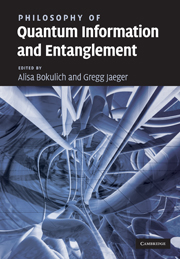Book contents
- Frontmatter
- Contents
- List of contributors
- Preface
- Introduction
- Part I Quantum entanglement and non-locality
- Part II Quantum probability
- 4 Bell's inequality from the contextual probabilistic viewpoint
- 5 Probabilistic theories: What is special about Quantum Mechanics?
- 6 What probabilities tell about quantum systems, with application to entropy and entanglement
- 7 Bayesian updating and information gain in quantum measurements
- Part III Quantum information
- Part IV Quantum communication and computing
- Index
7 - Bayesian updating and information gain in quantum measurements
from Part II - Quantum probability
Published online by Cambridge University Press: 04 August 2010
- Frontmatter
- Contents
- List of contributors
- Preface
- Introduction
- Part I Quantum entanglement and non-locality
- Part II Quantum probability
- 4 Bell's inequality from the contextual probabilistic viewpoint
- 5 Probabilistic theories: What is special about Quantum Mechanics?
- 6 What probabilities tell about quantum systems, with application to entropy and entanglement
- 7 Bayesian updating and information gain in quantum measurements
- Part III Quantum information
- Part IV Quantum communication and computing
- Index
Summary
Introduction
In many situations, learning from the results of measurements can be regarded as updating one's probability distributions over certain variables. According to Bayesians, this updating should be carried out according to the rule of conditionalization. In the theory of quantum mechanics, there is a rule that tells us how to update the state of a system, given observation of a measurement result. The state of a quantum system is closely related to probability distributions over potential measurements. Therefore we might expect there to be some relation between Bayesian conditionalization and the quantum state-update rule. There have been several suggestions that the state change just is Bayesian conditionalization, appropriately understood, or that it is closely analogous.
Bub was the first to make the connection between quantum measurement and Bayesian conditionalization in a 1977 paper, using an approach based on quantum logic. The connection is renewed in discussions by Fuchs and also Jacobs in 2002, where again the analogy between the quantum state update and Bayesian conditionalization is pointed out. At the same time, Fuchs draws attention to a disanalogy – namely that there is an “extra unitary” transformation as part of the measurement in the quantum case. In this chapter, I will first review the proposals of Bub, Jacobs, and Fuchs. I will then show that the presence of the extra unitaries in quantum measurement leads to a difference between classical and quantum measurement in terms of information gain, drawing on results by Nielsen and Fuchs and Jacobs.
Information
- Type
- Chapter
- Information
- Philosophy of Quantum Information and Entanglement , pp. 151 - 168Publisher: Cambridge University PressPrint publication year: 2010
Accessibility standard: Unknown
- 18
- Cited by
